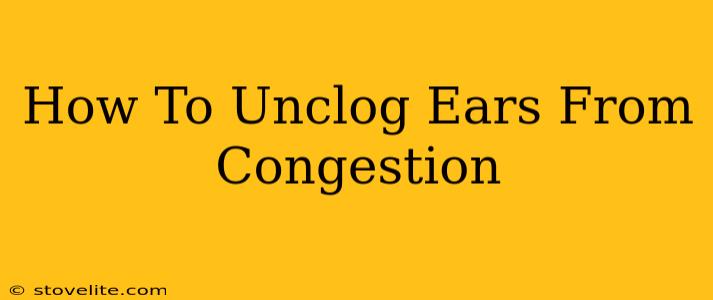Feeling that annoying pressure and fullness in your ears due to congestion? It's a common problem, often stemming from colds, allergies, or even changes in altitude. The good news is that there are several safe and effective ways to unclog your ears and relieve that uncomfortable feeling. Let's explore some simple home remedies and when to seek professional help.
Understanding Ear Congestion
Before diving into solutions, it's crucial to understand what causes that plugged-up sensation. Congestion typically occurs when the Eustachian tubes, the tiny canals connecting your middle ear to the back of your throat, become inflamed or blocked. This blockage prevents proper air pressure equalization, leading to that familiar feeling of fullness or pressure. Common culprits include:
- Upper respiratory infections (URIs): Colds, the flu, and other respiratory illnesses are major contributors.
- Allergies: Seasonal allergies and other allergic reactions can inflame the Eustachian tubes.
- Altitude changes: Rapid changes in altitude, such as during air travel, can disrupt air pressure and cause ear congestion.
- Sinus infections: Infections in the sinuses can spread to the Eustachian tubes.
- Fluid buildup: Excess fluid in the middle ear can also contribute to the feeling of clogged ears.
Safe Home Remedies to Unclog Ears
Several simple home remedies can help relieve ear congestion. Remember, always consult your doctor if your symptoms worsen or persist for more than a few days.
1. The Valsalva Maneuver
This technique involves gently increasing the air pressure in your ears to open the Eustachian tubes.
- How to do it: Close your mouth, pinch your nose shut, and gently blow air out of your nose as if you were trying to blow your nose. You should feel a slight popping sensation in your ears as they open. Do not force it; this can cause damage.
2. Yawning
Yawning naturally opens the Eustachian tubes, providing a gentle way to equalize pressure. Try to yawn widely and deeply.
3. Swallowing
Swallowing also helps to open the Eustachian tubes. Try swallowing frequently, especially while chewing gum or drinking water.
4. Warm Compress
Applying a warm compress to the affected ear can help soothe inflammation and reduce discomfort. Simply soak a clean washcloth in warm water, wring out the excess, and apply it to your ear for 10-15 minutes.
5. Saline Nasal Spray or Rinse
Using a saline nasal spray or rinse can help clear nasal passages, indirectly relieving Eustachian tube blockage. Follow the product instructions carefully.
When to See a Doctor
While home remedies often effectively treat mild ear congestion, you should consult a doctor if:
- Symptoms persist for more than a few days.
- You experience severe ear pain or a sudden loss of hearing.
- You have a fever.
- You experience drainage from your ear.
- You notice any changes in your vision or balance.
Ignoring persistent ear congestion can lead to more serious complications. Seeking professional medical advice ensures proper diagnosis and treatment, preventing potential problems.
Preventing Ear Congestion
While not always preventable, these tips can reduce your risk of experiencing ear congestion:
- Stay hydrated: Drinking plenty of fluids helps thin mucus, easing congestion.
- Avoid smoke and irritants: Smoking and exposure to irritants can aggravate existing congestion.
- Manage allergies: If you have allergies, take appropriate measures to minimize exposure to allergens.
By understanding the causes of ear congestion and implementing these helpful remedies, you can effectively manage this common issue and regain comfortable hearing. Remember that early attention and proper care are key to maintaining ear health.

